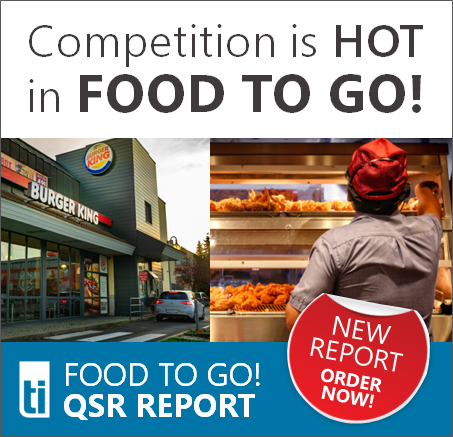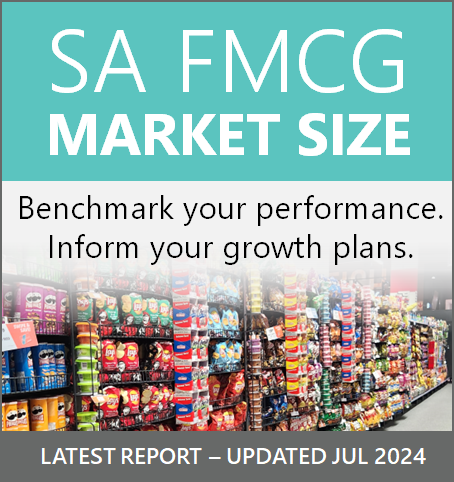
THIS ISSUE: 28 Jun - 04 Jul
A big play for Shoprite this week in the independent and informal sector, Clicks takes a step back from a vertically integrated business model, ex-Pick n Pay CEO Pieter Boone cashes in, Carrefour expands in France, Nampak and RCL FOODS make bank, and food inflation eases for the third month in a row. Enjoy the read.
YOUR NUMBERS THIS WEEK
.png)
YOUR NUMBERS THIS WEEK
RETAILERS AND WHOLESALERS
-
Shoprite Bulking up
Taking things to the next level this week is, as usual, Shoprite, with the launch of (checks notes) an entirely new route to market for the business. Bulk-buying customers of its Shoprite Cash & Carry stores can now browse and purchase a wide range of goods at highly competitive prices through a fully automated online shopping system, with free delivery within a 50km radius – or to put it another way, e-commerce for spazas. “The new digital platform provides customers with reliable and visible stock access and delivery services that eliminate the need to store excess inventory, frees up much needed cash flow, and gives business owners more time on the shop floor to focus on their customers and business growth,” explains head of B2B eCommerce Mark Cotton. The new system also streamlines the purchasing and fulfilment process for in-store traders, allowing them to log in, access customer and product information, build and fulfil orders more efficiently. They also benefit from instant cash savings and special offers through the Xtra Savings Club loyalty programme.
Comment: Shoprite claiming a growing slice of SA’s still-thriving informal and independent trade.
-
-
Clicks Rainbows, fine. Unicorns? Nuh uh.
Last year, you may recall, the Constitutional Court passed against Clicks a judgement that disallowed the business from owning pharmacies and producing its own medicines (it was allowed to do either, but not both). This week, bowing to the inevitable, Clicks announced that it would be selling its manufacturing subsidiary Unicorn Pharmaceuticals, the business which brought the wrath of the Independent Community Pharmacy Association down upon Clicks seven years ago in the action, leading to the ultimate finding. Last May, the Department of Health notified Clicks that no further retail pharmacy licence applications would be processed until it had complied with the ruling. Famously unflappable Clicks CEO Bertina Engelbrecht thanked the Department for their “positive engagement in ensuring a sustainable solution for all stakeholders”. Various commentators have said that the disposal of Unicorn, which manufactured generic meds for Clicks, should have no material impact on the bottom line. The Group is confident that the sale will be finalised by the end of the July, however it has not yet revealed the name of the potential buyer.
Comment: “Err on the side of caution!” is our cry, when it comes to market competition and the protection of the consumer.
-
-
In Brief Cashing in
Congrats to ex-Pick n Pay CEO Pieter Boone, who took home a handsome R15.7m “termination settlement”, plus his R7.8m base salary, and R1.1m in other benefits for the last FY, having been held widely responsible for the flawed Ekuseni strategy. “The problem we were facing was correctly diagnosed; it was the solution that was strategically flawed,” noted outgoing chair Gareth Ackerman in the latest Annual Report. Next, nice one from Woolies, who has extended its partnership with FoodForward SA (FFSA) for another three years, committing R3.45m to support the organisation’s work in alleviating hunger across South Africa. Last FY, the organisation recovered and distributed 21,760 tons of food, 65% from Woolworths’ contributions via the FoodShare platform. Finally, big up to the Shoprite Group, recognised as a Top Employer for 2024 by the Top Employers Institute, a global authority on excellence in people practices.
Comment: Pieter Boone was not alone in designing the Ekuseni strategy. Nor is he alone in vacating the top floor…
-
-
International Retailers The French connection
Carrefour seems to be on a bit of a low-key tear in its domestic market. For starters, the business has completed the acquisition of the Cora and Match retail groups from Louis Delhaize, with 60 hypermarkets and 115 supermarkets respectively. Secondly, Carmila, in which Carrefour has a 36% stake, finalised the acquisition of most of the shares of Galimmo, also from Delhaize; Galimmo owns 52 shopping galleries adjacent to Cora stores. It is also expanding its presence in forecourts, with successful tenders from Shell and TotalEnergies, and 350 garage shops expected to be trading by the end of the year. Closer to home, Carrefour remains a force in the burgeoning Kenyan market, although not without obstacles: a month ago, the High Court upheld a decision that retail group Majid Al Huttaim Hypermarkets, which operates as Carrefour, is guilty of the abuse of buyer power with respect to yoghurt supplier Orchards Ltd. At issue is a system of rebates that sat heavily with Orchard.
Comment: A global giant entrenches its market position at home.
MANUFACTURERS AND SERVICE PROVIDERS
-
Nampak Packing heat
A story of loss from Nampak, but a good story nevertheless: the packaging giant increased revenue +7% to R6.2bn for the six months through March, assisted thither by the improved performance of its Bevcan and DivFood units, and held its net loss to R120m, after losing R2.5bn a year ago. And excluding losses from discontinued operations, the business posted a net profit of R395m. Under newish CEO Phil Roux the business has restructured aggressively, selling off loss-making assets worth R2.2bn, including BevCan Nigeria, for R1.3bn, and Liquid Cartons here at home, from R450m – although both transactions are awaiting the nod from the respective competition authorities. The disposal of assets in Angola and Zimbabwe are still under consideration. “We have built resilience. We have a plan,” says Roux. “There’s still value to be had.”
Comment: Another great business fighting its way back from unfortunate expansion into challenging markets and sectors.
-
-
In Brief Taking flight
Huge congrats to venerable poultry brand Rainbow Chicken on its listing last week on the JSE. Related, parent company Remgro are talking up the prospects of RCL FOODS, whose full-year headline earnings they expect to rise by at least +75%, on the back of strong performances from both the newly unbundled Rainbow Chicken business and the groceries division. The disposal of Vector Logistics and insurance proceeds in respect of fire damage at its Komatipoort raw sugar warehouse also didn’t hurt. Moving on, South African Breweries (SAB) has announced its partnership with the Olympics and Paralympic Games through its new alcohol-free brand Corona Cero. “As the first-ever global beer sponsor of the Olympic Games, Corona Cero offers a fresh perspective on celebration for fans and athletes around the world,” says VP of Marketing Vaughan Croeser. Finally, South Africa has asked the World Trade Organization (WTO) to set up panels to adjudicate disputes over its citrus fruit exports to the European Union, over EU measures to combat the incidence of Citrus Black Spot and the spread of the false codling moth, which damages the fruit. South Africa argues that these measures will cost the industry R500m in lost exports.
Comment: A crisis that needs an urgent fix if this critical industry is to deliver the revenue and jobs of which it is capable.
TRADE ENVIRONMENT
-
Inflation Cool runnings
Food inflation ran under CPI for the third month in a row in May, according to the bearded sages over at StatsSA, coming in at +4.7% YoY, compared with +5.2% for CPI. What’s going on? Let’s have a word with the Bureau for Food and Agricultural Policy (BFAP). “Exchange rate depreciation for much of 2023 was a critical contributor to sustained high food inflation, but the value of the rand strengthened substantially in June this year,” they aver. “Markets responded positively to the formation of the Government of National Unity and … a stable partnership in this regard could result in further exchange rate appreciation, which would in turn reduce inflation further.” Food categories which saw the highest inflation in May were sugar and sugar-rich foods at 15.5%, vegetables at 7.6%, dairy and eggs at 7.5%, and bread and cereals at 3.9% and meat. Oils and fats were down by -2.3%.
Comment: A bright spot in an often dark economic picture, particularly for poorer South Africans.
Sign up to receive the latest SA and international FMCG news weekly.
Tatler Archive
Next Event
19 September: Corporate Retail Comparative Performance H2
“You can't compare an apple to an orange. It will cause a lot of self-esteem issues.”




1.png)